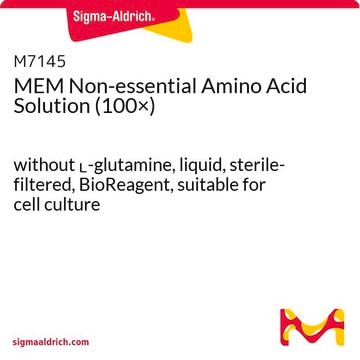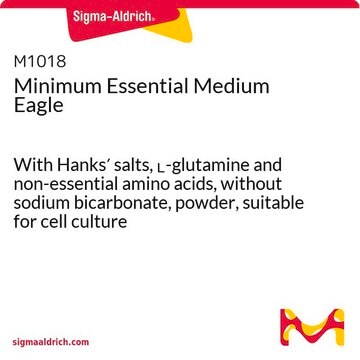M5650
Minimum Essential Medium Eagle
With non-essential amino acids, Earle′s salts and sodium bicarbonate, without ʟ-glutamine, liquid, sterile-filtered, suitable for cell culture
Synonym(s):
EMEM, MEM
About This Item
Recommended Products
product name
Minimum Essential Medium Eagle, With Earle′s salts, non-essential amino acids and sodium bicarbonate, without L-glutamine, liquid, sterile-filtered, suitable for cell culture
sterility
sterile-filtered
form
liquid
technique(s)
cell culture | mammalian: suitable
impurities
endotoxin, tested
components
phenol red: yes
NaHCO3: yes
L-glutamine: no
sodium pyruvate: no
HEPES: no
Earle’s salts (5% CO2): yes
shipped in
ambient
storage temp.
2-8°C
Looking for similar products? Visit Product Comparison Guide
General description
Application
- HeLa cells
- Madin-Darby canine kidney (MDCK) cells
- chondrosarcoma cell line
This medium may be preferred for the growth of adherent cells in the presence of reduced serum or as a base for the development of a serum-free medium.
Reconstitution
also commonly purchased with this product
related product
supplement
Storage Class Code
11 - Combustible Solids
WGK
WGK 1
Flash Point(F)
Not applicable
Flash Point(C)
Not applicable
Certificates of Analysis (COA)
Search for Certificates of Analysis (COA) by entering the products Lot/Batch Number. Lot and Batch Numbers can be found on a product’s label following the words ‘Lot’ or ‘Batch’.
Already Own This Product?
Find documentation for the products that you have recently purchased in the Document Library.
Customers Also Viewed
Articles
A large selection of MEM formulations. Minimum Essential Medium (MEM), developed by Harry Eagle, is one of the most widely used of all synthetic cell culture media.
A large selection of MEM formulations. Minimum Essential Medium (MEM), developed by Harry Eagle, is one of the most widely used of all synthetic cell culture media.
A large selection of MEM formulations. Minimum Essential Medium (MEM), developed by Harry Eagle, is one of the most widely used of all synthetic cell culture media.
A large selection of MEM formulations. Minimum Essential Medium (MEM), developed by Harry Eagle, is one of the most widely used of all synthetic cell culture media.
Our team of scientists has experience in all areas of research including Life Science, Material Science, Chemical Synthesis, Chromatography, Analytical and many others.
Contact Technical Service





